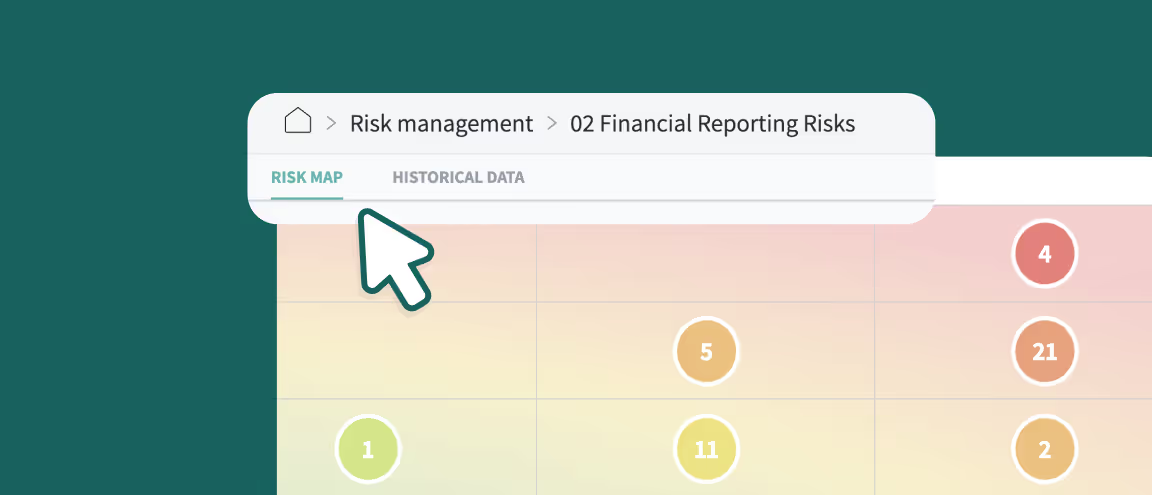Table of content

Risk management
Create a risk directory
Document all risks that your organization is exposed to in a structured way. The risk directory is the overview of risk for your entire organization.
Document your risk
Document and describe the process and sub-processes that constitute a risk. Add as many or few as you deem necessary.
Assign assertions
Assign assertion of any given risk for your financial statements. Use our standard options, or customize to your needs.
Designate objectives
Align with the COSO framework and designate an objective: Strategic, Operations, Reporting, Compliance. Use our standard options, or customize to your needs.
Manage access
Grant access individually to ensure only relevant users are granted access to risks directories.
Global vs. local risk
Designate global risks that apply to all your entities, or local risks that apply to specific ones.
Set up entities
Create entities so that you can allocate risk to all entities (global risk) or specific entities (local risk). Entities can have many, some or no risks.
Assign risk to entities
Assign risks documented in your risk directory to entities. Entities can have many, some or no risks.
Assess your risks
Is the likelood certain or remote? Is the impact on your organization high or low? Choose the relevant likelihood and impact for each risk.
Re-assess your risks
If you adjust your risk assessment at a later date, then it is automatically logged for audit readiness.
Set a risk response
Choose how your organization will respond to a risk. Select between predefined option: Not applicable, Transfer, Avoid, Reudce, Accept.
View risk map
See how your risks are mapped on a classic color-coded risk map. Use our standard options, or customize to your needs.
Set filters
Adjust your view of the risk map by using a filter to focus on selected content. You can also shared this filtered view with other stakeholders.
Connect mitigating control
Connect a relevant mitigating control action from the Control Module.
See risk assessment activity
View the activity of a specific risk and get an overview of when it was assessed over time.
View historial data
View the history of a specific risk as the likelihood, impact and related actions evolve over time.

Internal control system
Create a control program
Structure and centralize all internal controls across your organization. Build a consistent, audit-ready framework tailored to your governance needs.
Set up a control
Describe and define controls in a standardized way. Add control details, purpose, frequency, and responsible roles.
Design your controls
Add different types of tasks to your controls for both the responsible and reviewers. The flexible designer allows you to customize controls and requires comments, file attachments and more.
Plan the control timing
Plan how many days or hours the control responsible and reviewer(s) have to perform the control and the review. Set the time for when the responsible should receive the control.
Assign control responsibility
Designate ownership for each control and ensure three lines of defense. Assign who is the responsible control performer, first- and second reviewer. You can also re-assign responsibility if an employee leaves.
Schedule controls
Set up your controls to be send out on a recurring basis. Scheduling can be set up to take into account weekends and public holidays to best match your financial calendar.
Send manual controls
Send a manual control at a specific point in time, or send the control immediately.
Automated reminders
Reminders are automatically sent out to control performers and reviewers. Decide the timing and frequency of the automated reminders.
Manage access
Grant access individually to ensure only relevant users are granted access to control programs.
Full control history
All changes to controls—descriptions, owners, assignments, or status—are automatically logged, giving you a full audit trail for every update and decision.
Filter based on tags
Use the built-in tag management to more quickly filter on specific topics. This requires that you consistently use tag management in Impero.
Create a template
Reusing the same format or details? Create a template for your control program or control to share with other users.
Suspend controls
Completed a program? Simply deactivate the program. You can re-activate it again if you need it at a later date.

Reporting & audit documentation
Audit-ready activity log
Gain a quick overview of activity on a specific control in the activity log. Helpful for both admins, as well as internal and external audit.
Performance report
Generate a report based on the status of your controls, for example: complete, pending and overdue controls. We call them Status reports.
On-time rate
See how many of your controls are completed according to their due date. A great way to spot recurring control performers, reviewers or entities that are overdue.
Reports based on specific control answers
Get an overview of the responses of selected single-choice questions from either radio button or drop down answers. This helps you track specific answers that provide more detailed context on the performance and effectiveness of your controls. We call them Task-Based reports.
Workload report
See how many upcoming controls are planned, so that the workload can be reallocated to your financial calendar year.
Datasheet reports
A report based on a datasheet (or extensive data table) in one of your control programs. The datasheet report allows to quickly report on data collected from various controls and presented in a consolidated list.
Share reports
Use the push functionality to send recurring reports to yourself or other stakeholders. The reports can also be sent on an adhoc basis, if preferred.
Filter and share reports
Filter your reports to a specific view. Share the link with relevant stakeholders for an easy view of the same data.
.svg)
Testing control effectiveness
Create a control test program
Define the scope and objectives of your control testing. Build structured programs to assess the effectiveness of internal controls across your organization.
Set up a single control test
Test an individual control for a specific entity. Add details such as purpose, frequency, responsible roles, and expected outcomes.
Perform bulk control tests
Run multiple control tests at once across several entities. Save time by standardizing testing parameters and applying them at scale.
Plan control test timing
Schedule when control tests should be performed. Define lead times for responsible testers and reviewers to complete their tasks.
Assign test responsibility
Clearly define ownership for each test. Assign responsible testers, reviewers, and approvers to ensure accountability throughout the process.
Schedule recurring tests
Set your control tests to run on a recurring basis. Align the schedule with financial cycles and account for weekends and public holidays.
Send ad-hoc control tests
Trigger a manual control test whenever needed. Perfect for urgent or unexpected testing scenarios.
Automated reminders
Keep everyone on track with automated notifications. Customize the timing and frequency of reminders for testers and reviewers.
Capture results and evidence
Document outcomes, upload supporting evidence, and require comments for transparency. Ensure every test is audit-ready.
Full testing history
Track every change: scope updates, assignments, results, all in an immutable audit trail. Gain complete visibility for audits and reviews.
Filter and tag tests
Use tags to organize and quickly locate tests by entity, program, or status. Make large-scale control testing simple and efficient.

Other features & functionality
Dashboard
Get an overview of your programs, including number of pending- and overdue controls, as well as your pending actions.
Your programs
See an overview of your control programs with the latest status.
Your pending actions
Get a personalized overview of controls assigned to you
User management
Easily add, edit and remove user access. Create users to grant access to Impero and assign controls. Users can be created both for individuals within your organization, as well as external individuals. You can create a single user, multiple users and user groups.
Tag management
Set up your tag library and customize tags in the tag management feature. Apply tags to controls, programs and assignees. Use them to filter certain data within the system and provide a better overview of types of controls, control programs and users/assignees.
Export options
Generate exports for almost all different areas of the Impero platform, including specific time ranges, types of activities, users, eventlog data and more.
Eventlog
The eventlog contains detailed information about changes made in Impero by all users. Per default, you can only see your own activity. Admins can view the full user log.
Power BI connector
Custom Connector that connects to the Impero Public API and extract data ready for modelling and analysis in Power BI.
Open API
The open API allows the Impero platform to be integrated with other third-party sytems.
Single-sign on (SSO)
For added security, we're intgrated with Okta allows you to use your organziation's SSO to log into the Impero platform.
Two-factor authentication (2FA)
An optional choice and an easy way to strengthen security, especially when using Impero from outside the company domain.
Start with what you have, then expand
Don't have all your risk, control and compliance programs ready? Many of our customers start in one business area, and then expand over time.
Ready for more Impero?
Stay informed on all things Impero — webinar & event invites, exclusive content, product launches and more! Or let us show you why Impero is the right choice for your risk, internal control and compliance needs.









